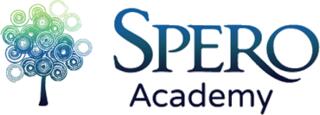
by Devin Taylor
When we think about teaching life skills in school, many of us think of the development of those
skills as the ultimate objective. Afterall, the point of life skills is to enable students to participate
as fully and independently in life as possible. And while any measure of increased
independence is shown to improve quality of life and overall happiness, we tend to think of
these skills as something that will benefit children “someday.” Someday, they will shop for
groceries and prepare meals. Someday, they will choose appropriate clothing and decide what
to do on a Friday night. Someday they may have a job and manage money.
With this seemingly far-off vision in mind, it’s easy to overlook the immediate benefits of
incorporating life skills into the school day. By building student confidence and problem-solving
skills, life skills provide a foundation for deeper, more cooperative and contextualized
learning--like project-based and service learning.
Spero Academy’s service-learning program places students in multiple service roles and gives
them a variety of occupational experiences and opportunities to practice civic engagement.
Most central, and perhaps the most popular among students and staff alike, is the Spero
Academy Coffee Cart.
About Coffee Cart
Coffee Cart was founded by current PLS 6 teacher, Erica Kirsch.
In 2017, Kirsch was looking for a way to further engage her 5th and 6th grade ASR students
with the lessons they were practicing in math. They’d been hard at work learning data graphing,
addition, and money skills and were ready to take it to a new level. “The goal was for students to
get hands on practice with real world math skills,” says Kirsch, “as well as social skills and
employment/workplace skills.”
Students participated in every step of the planning process, reviewing data from a staff survey,
choosing items to sell, and determining prices of items. They prepared and stocked the cart
before hand, and they cleaned up and counted the money after each service.
“Our students seemed to feel an increased sense of belonging to our school community when
they participated in running the coffee cart,” says Kirsch, adding: “When our everyday school
routines start to get old or feel redundant, service learning projects are a great way to shift our
students’ focus to the bigger picture.”
The National Service-learning Clearinghouse and National Youth Leadership Council have
identified six qualities of effective service-learning: Integrative, Reflective, Contextualized,
Strength-based, Reciprocal, and Lifelong. Now in its third year, Coffee Cart comprises these six
qualities in a way that is uniquely relevant to students in every classroom setting at Spero
Academy.
Coffee Cart is Integrative
Kirsch’s coffee cart endeavor helped lay the groundwork for service learning at Spero Academy.
This year, the class is led by Jordan Bennett, who talks about the integrative nature of the
coursework and the opportunity it presents to incorporate multiple subjects and lessons into one
curriculum. “We’re learning about the democratic process,” says Bennett, “and also practicing
math skills, cleaning skills, customer service, and social skills.”
The Coffee Cart experience integrates more than just academic and social learning curriculum.
For many students, the work provides a degree of natural sensory input that is often missing
from the classroom setting, and has to be added through other accommodations and
modifications. Whether a student has trouble staying focused on a task or becoming engaged in
the task initially, sensory input plays an important role. A simple task like washing dishes in
warm soapy water can become an appropriately calming or alerting sensory experience.
Coffee Cart is Reflective
In addition to operating Coffee Cart, Bennett’s service-learning class has taken on other jobs
around the school, including helping to maintain our occupational therapy spaces. They’re a
busy crew, but they still take time to reflect on their experience. “We talk about what our favorite
jobs are,” says Bennnett “and we talk about why.”
One of the challenges to the reflective process, it seems, is time. Both Bennett and Kirsch note
the amount of time that service-learning projects actually consume. “It takes time to prepare and
fit in all of the tasks that the students need to be involved in order to feel ownership of
service-learning projects,” says Kirsch, “but it’s totally worth it!”
Sometimes the reflective process extends beyond the hours of the school day. According to
Kirsch, parents reported that students would talk about their experience at home without
prompting. For some students, unprompted conversation about the events of their day is an
uncommon occurrence and something they practice in school. These milestones in social
language skills are one of the unique goals of service-learning at Spero Academy.
Coffee Cart is Contextualized
Students in every classroom setting at Spero Academy are taught about the importance of
being flexible and accepting. But it’s hard to know what this looks like when you’re only talking
about it. Visuals and examples help, but they can be difficult to generalize.
Service learning opportunities— like Coffee Cart— help put these terms into context. For
instance: What do you do when coffee is a dollar and a customer hands you four quarters or a
five dollar bill? How do you adapt your sales pitch when you run out of light roast?
If someone says “no thanks” to coffee, what can you offer them instead?
If a customer asks a question and you don’t know the answer, what can you do or say?
Coffee Cart is Strength-based
A strength-based approach utilizes existing strengths, rather than focusing on what is missing.
Some of us find it difficult to solve problems that come at us while we’re sitting at a desk, but put
us in a setting where we’re moving, interacting, and doing, and suddenly those critical thinking
skills come to life! Bennett talks about the different types of learners under her guidance and
how much they seem to learn and retain. In particular, she notes the success and enthusiasm of
the kinesthetic learners in the group. “It gets them moving, they’re excited ... it gives purpose to
the interaction.”
This purposeful communication is helpful to students who find it difficult to interact in
unstructured social situations. These students excel in interpersonal exchanges when given the
right structure and motivation. Some students struggle with a lack of intrinsic motivation, but
become very driven when participating in service learning. “There’s instant gratification,”
Bennett observes, “and a lot of the students are motivated by a cause.”
Coffee Cart is Reciprocal
Students lend their time and talent to a much-appreciated service, and in turn they are able to
participate in a form of learning that allows them to move, engage, and experience— all
important qualities for experiential, kinesthetic, interactive, and tactile learners.
Teachers create unique and integrative curriculum and, in return, experience an increase in
student engagement, as well as the opportunity to experiment with different approaches.
Spero staff and visitors enjoy the convenience of onsite hot beverage service while participating
as co-educators. “Our customers are really good about challenging the students appropriately to
demonstrate what they know,” says Bennett. In this way, members of the Spero community are
able to forge and strengthen relationships with the students, taking an active role in shaping the
Spero community.
Coffee Cart is Lifelong
Most of us can remember tackling problems in school but we probably forgot a lot of what we
learned. Solving a problem in the “real world” has a way of helping that information stick. It also
promotes self-awareness and gets students thinking about the world around them and the
needs of others.
Relationship to others is another lasting takeaway. By assuming additional roles within the
community, students form new relationships and develop nuances to those already formed. This
empowers students who face challenges in building relationships, and may even help them
navigate and more fully participate in social opportunities down the road.
Just for Fun!
How does service learning integrate our STAR acronym?
● Pushing the cart and pouring hot coffee means making SAFE CHOICES!
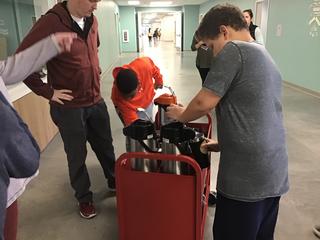
● Sometimes you get a customer who wants to pay in nickels. Counting change is a lot of
work, so we’ll have to be ACCEPTING and TRY OUR BEST!
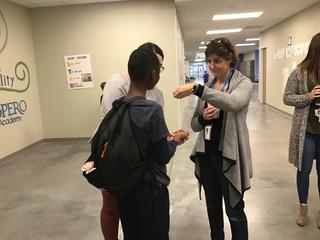
● Managing money is a big RESPONSIBILITY...
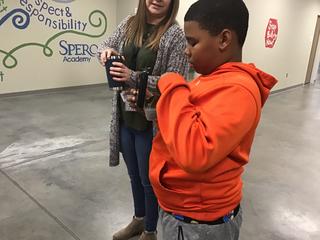
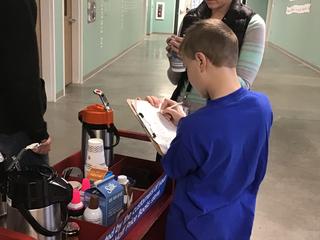
● And we are RESPECTFUL to our customers and to each other!
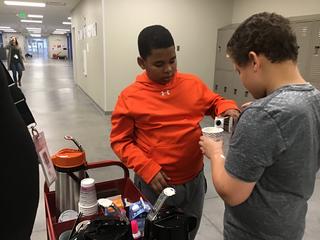
Coffee Cart is a philanthropic endeavor. All profits are donated to a charitable organization of
our students’ choosing. We are grateful for donations of supplies, including coffee cups, coffee,
and dairy/non-dairy creamers. These generous donations from staff and regular patrons of
Coffee Cart enable more of the money to go to the cause!
